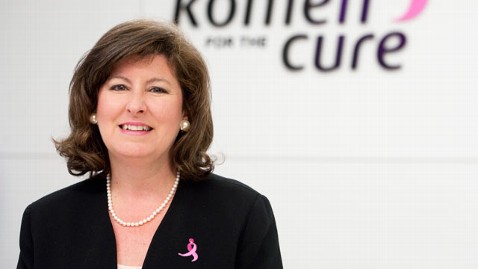Breast Cancer Charity Giant Cuts Ties to Planned Parenthood

Anti-Abortion Stalwart Karen Handel via Bill Clark/Getty Images
Leading breast cancer charity Susan G. Komen for the Cure abruptly severed its alliance with Planned Parenthood yesterday when Komen officials revealed they would halt a grant program used to pay for breast cancer screenings and educational programs.
Planned Parenthood, long in the cross-hairs of conservative activists, blamed the decision on political influences, foremost among them Komen's recently ascended vice president, Karen Handel, a Sarah Palin favorite who had run for governor in Georgia two years ago on a fierce anti-abortion platform.
Last year, Komen provided $680,000 to Planned Parenthood. In 2010, when Handel wrote in a campaign blog that she "did not support the mission of Planned Parenthood" and planned to end state-sanctioned aid if elected, the foundation gave an additional $580,000. Handel's campaign flamed out and she joined Komen last year.
Alongside her now is abortion foe Jane Abraham, board member at The Nurturing Network, a so-called "crisis pregnancy" organization dedicated to dissuading young, pregnant women from having abortions. Maureen Scalia, a noted anti-abortion advocate and wife of the conservative Supreme Court Justice Antonin Scalia, sits on the TNN board with Abraham.
While Komen has not responded to the charges of political meddling, and did not return calls and email from ABC News, the foundation has publicly tagged the decision to an ongoing congressional investigation, led by Rep. Cliff Stearns, R-Fla., into Planned Parenthood's alleged use of public funds for abortion. The Hyde Amendment, a rider appended to every federal appropriations bill since 1976, bans doctors from using federal money to perform the procedures.
Komen has recently adopted a rule forbidding it from passing any money to groups under congressional investigation.
But Planned Parenthood's leaders are not buying it.
"We know our opponents put their ideology over women's health and lives," Planned Parenthood of America President Cecile Richards wrote in an email to supporters late yesterday. "What we never expected is that an ally like the Komen Foundation would choose to listen to them."
The split is more bad news for Planned Parenthood, which provided an estimated 170,000 early screenings to low-income and at-risk women in the six years since the beginning of its partnership with the Komen Foundation. Recent cuts to state and local budgets have made the reproductive healthcare provider more reliant on individual and corporate donors.
Rebecca Cavanaugh, the vice president for public affairs at Planned Parenthood of Western Pennsylvania, said she was taken aback when she got word of the decision late yesterday.
"It's a shock to the system," Cavanaugh told ABC News . " It was a really good partnership for five or six years… We share board members with their local affiliate and imagine some of them might be upset. We're advocates for women's health."
The Western Pennsylvania Planned Parenthood is not solely dependent on Komen funds, but they do have an indirect connection.
As Cavanaugh explained, patients at her Pittsburgh clinic are referred to a private women's healthcare provider, Adagio Health, when a screening turns up something abnormal. Then, with Komen funds, Adagio would provide patients with vouchers for proper mammograms.
Now even that is in doubt.
"As a result of this decision is that Planned Parenthood of Western Pennsylvania will no longer be able to access these vouchers and will have to have the patient call in and have the voucher mailed to them," Cavanaugh wrote this afternoon in an email to ABC News.
"This is a purely political move," said Jodi Jacobson, the editor-in-chief of RH Reality Check, a website focused on issues related to women's reproductive health.
"When something that's non-profit gets too corporatized, you I get a little concerned," she said, noting Komen's long list of corporate sponsors. "You wonder whose interests at heart. Private organizations like Planned Parenthood rely on cross-granting to get services to low income women."
"Communities of color will be disproportionately affected, especially as more women have been turning to them because of the state of the economy," Jamia Wilson, formerly of Planned Parenthood but now serving as vice president of programs for the unaffiliated Women's Media Center, said in discussing Komen's decision. "They cowered to pressure, which is part of a larger push to appease anti-choice groups."
Just a year and a half ago, Komen leaders would have seemed to agree. Chief Scientific Advisor Dr. Eric Winer authored a long post backing the foundation's affiliation with Planned Parenthood, and going even further to underline its importance:
"Komen Affiliates provide funds to pay for screening, education and treatment programs in dozens of communities, in some areas, the only place that poor, uninsured or under-insured women can receive these services are through programs run by Planned Parenthood, " Winer wrote.
"As part of our financial arrangements, we monitor our grantees twice a year to be sure they are spending the money in line with our agreements, and we are assured that Planned Parenthood uses these funds only for breast health education, screening and treatment programs."